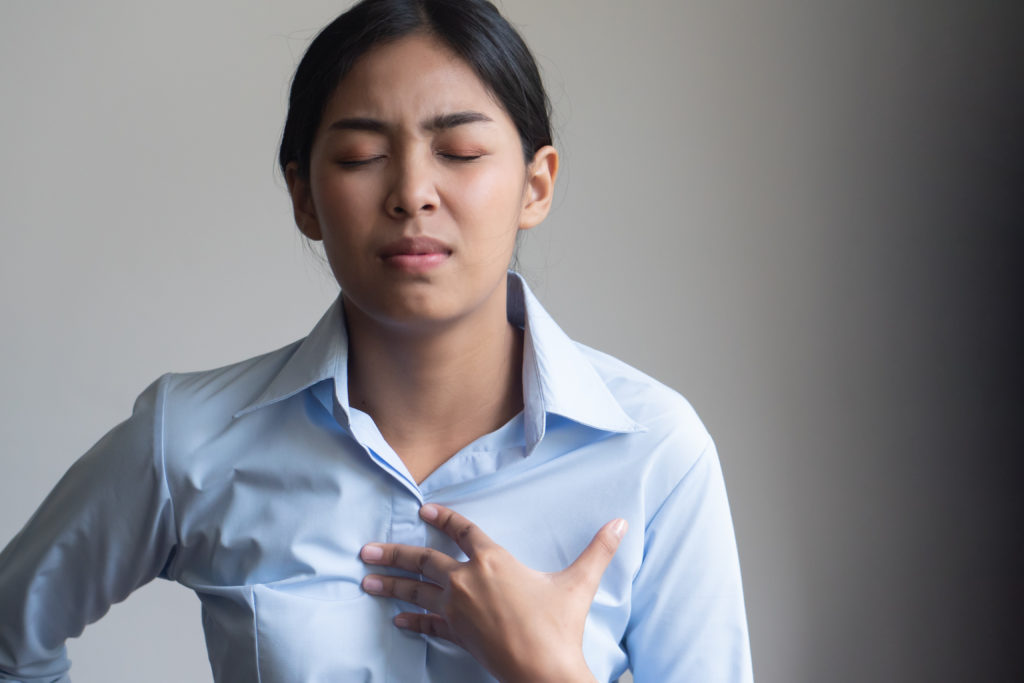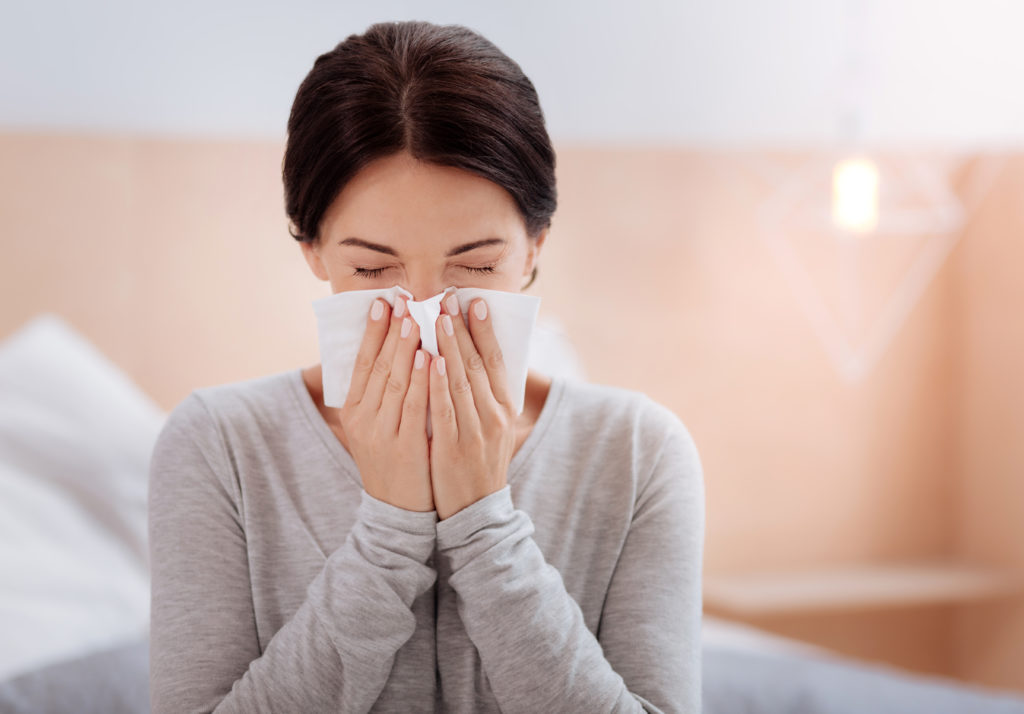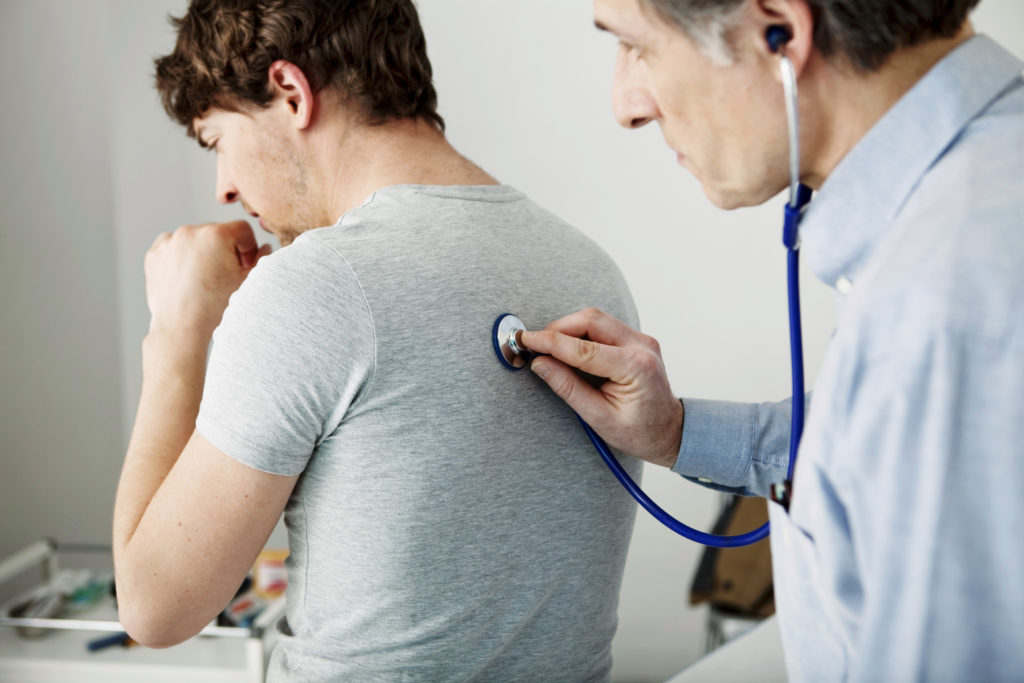August 17, 2022
7 Reasons Why You’re Coughing After Eating
Postprandial cough, or coughing after eating, is a common problem that many people face. There are many possible causes for this problem, and fortunately, most of them will not cause you long-term health problems. Let’s discuss some of the reasons you may be coughing after you eat and when you should see your healthcare provider.
Why do I cough?
A cough is your body’s way of responding to an irritation in the respiratory tract. Your body is using the air generated by the cough to try to force the irritant out.
Gastroesophageal Reflux Disease (GERD)
GERD or reflux is the most common cause of coughing after eating. Your stomach has circular muscles on both sides that help keep food and acid inside while it digests. Sometimes the muscles that keep food from going back into your esophagus and throat are weak, and acid can go the wrong way. Symptoms of GERD include
- Pain in your mid-chest or just below your rib cage

- Burning sensation in your chest or throat
- Taste of acid in your mouth
Some people have laryngopharyngeal reflux (LPR), a variant of GERD that can also be called silent reflux. Silent reflux may occur without pain. Symptoms of LPR include
- Hoarseness of your voice
- Cough which worsens after eating or when laying down
GERD can be treated with acid-reducing medications over-the-counter. If your symptoms persist for more than a week or recur frequently, you should see your healthcare provider. If GERD continues for long periods of time, you can develop precancerous changes in the esophagus and, in severe cases, even cancer.
Allergies
Allergies are a frequent cause of common cough. If you have allergies to something in the air around you, you may develop a cough at any time. Food allergies can cause coughing as well. Some types of severe food allergies can cause more dangerous health problems like anaphylaxis, but most food allergies are not that severe. Food allergies can develop at any time in your life, so even if you weren’t allergic as a child, you may develop an allergy as an adult. These usually occur a couple of hours after eating but may occur anytime. If you think you have food allergies, you should talk to your healthcare provider about allergy testing or elimination diets.
Asthma
If you have asthma, you may find that you cough after eating. Asthma is a chronic respiratory condition that is frequently associated with chronic cough. Some foods can trigger an asthma attack which can be as mild as an annoying cough after eating or as severe as significant difficulty breathing. If you have asthma, talk to your doctor about ways to avoid triggers and medications you can use if you have an attack.
Excessive Phlegm Production
Some foods, especially dairy-based foods, are known to cause excessive phlegm production. Eating foods like milk and cream can cause coughing after eating as the body tries to clear the phlegm from your airways. This is why a lot of singers and public speakers will avoid dairy-containing foods prior to performing or speaking engagements.
Respiratory infections
Bacteria and viruses can cause cough by multiplying in your airways and causing irritation. Viruses cause conditions such as the common cold, sinus infections, and Covid. Bacteria can be responsible for diseases like pneumonia. Coughing associated with infections usually goes away within a couple of weeks. Sometimes the cough will last even after other symptoms have resolved. Respiratory infections usually have other symptoms besides just cough:
- fevers
- muscle aches
- fatigue
- a general feeling of being unwell
If your symptoms are severe or if they last more than a week, you should see your doctor.
Aspiration
If you are coughing immediately after eating, then aspiration may be to blame. In aspiration, food or drink can get below the level of your vocal cords and irritate your airways. This is why you cough when you feel like the food “went down the wrong pipe”. In some cases, these food and drink particles can be inhaled all the way into your airways and cause inflammation or infection. Aspiration can cause chest pain, recurrent pneumonia, fevers, excessive saliva, wheezing, and cough. If you think you may be aspirating, you should talk with your healthcare provider. You may need studies to see how bad the aspiration is, and you may need a referral to a speech therapist to discuss ways to adjust your food and eating to avoid aspiration.
Dysphagia
The act of swallowing requires a lot of effort on the part of your body. The muscles in your mouth, throat, and esophagus have to coordinate to get the food from your mouth to your stomach. Sometimes your body has difficulty coordinating these processes and you can feel like food is getting stuck. You can also have dysphagia from narrowing of the esophagus or inflammation in the esophagus. If you feel like food is getting stuck, you should see your healthcare provider to discuss whether you need imaging to look at your esophagus.
When To See Your Primary Care For Coughing
There are many reasons why you may have a cough after eating. If your symptoms last for more than a week or recur frequently, it’s time to see your doctor or other health care provider to discuss options for diagnosis and treatment. If your cough occurs more frequently than just after meals, you should also talk to your doctor.
Red flags, or reasons that you should immediately talk to your healthcare provider include:
- Shortness of breath

- Difficulty breathing while laying down
- Sweating while or immediately after eating
- Feeling that your throat is closing
- Fevers
- Chest pain or pain in your arms
- Dizziness or fainting after eating
Healthcare Associates of Texas is made up of board-certified primary care and internal medicine doctors who can help you identify the cause of chronic coughing or concerning symptoms like the ones listed above. Find a location close to you.
DISCLAIMER
The information featured in this site is general in nature. The site provides health information designed to complement your personal health management. It does not provide medical advice or health services and is not meant to replace professional advice or imply coverage of specific clinical services or products. The inclusion of links to other web sites does not imply any endorsement of the material on such websites.